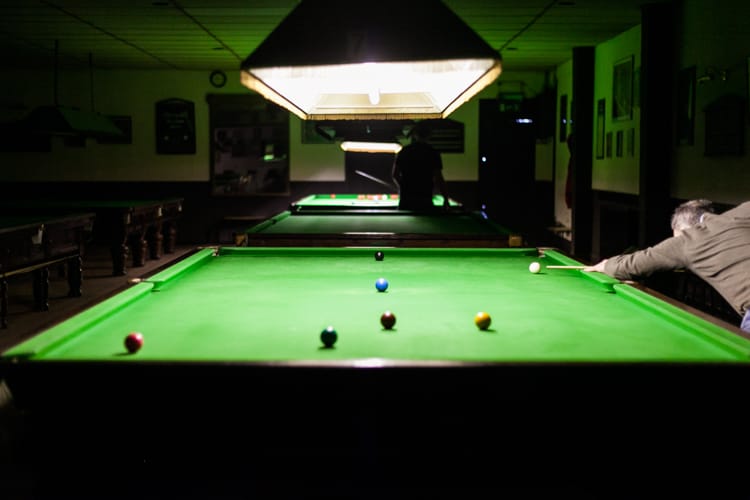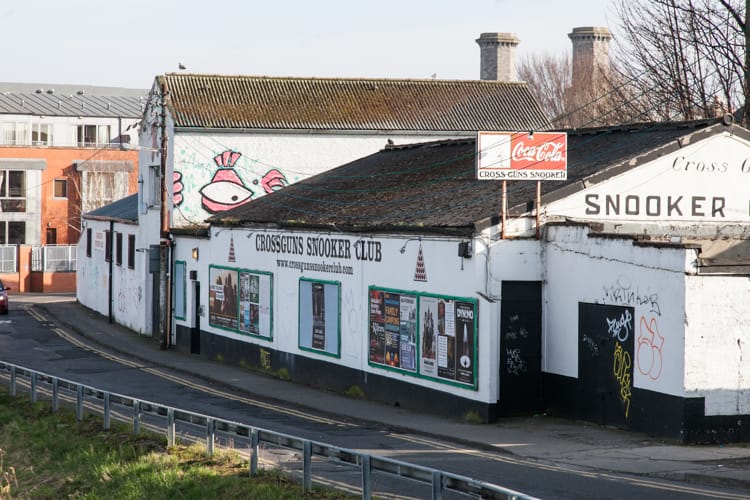Council moves on plan for 5,000 homes on lands between Inchicore and Ballyfermot
The changes will be gradual, said a council planner. “It’s not an overnight, you know, deployment of four or five thousand units in an area.”
As a child, CrossGuns Snooker Club owner Finbarr Ruane would watch his father at work repairing the tables and polishing the cues. Today, he does the same.

There is near silence inside the CrossGuns Snooker Club. The room is pitch-black at the edges, the only lights coming from six lamps hanging over six snooker tables which take up the guts of the space.
At one of the far tables, two lads pot ball after ball after ball in a seemingly endless game. And from behind a small alcove near the entrance peers Finbarr Ruane, snooker buff and third-generation owner of CrossGuns Snooker Club.
Located in Phibsboro along the Royal Canal, near the back of Mountjoy Prison, the club is still ticking over. On Easter Sunday it will have done so for 58 years. This makes it, as Ruane tells it, the oldest commercial snooker club in Ireland.
But its survival is hard work, defined by many ups and downs, he says.
“During the lean times you’re living week to week,” says Ruane. “But you know, my grandfather was through it, my father went through it and I’ve been through it so you know it’s just a pass if you can stick it out for a year or two.”

Ruane was raised on snooker. Frequenting CrossGuns as a toddler when his father, and his father before him, was behind the wheel, he would go on to play at champion level in the Irish leagues. These days he sees himself more as caretaker of the club, which he describes as “a museum to snooker”. It’s easy to catch his drift.
The smell of cigarettes, long stubbed-out, still lingers in the air, and photos of legendary players line the walls. Hard-won trophies sit proudly in a small, unadorned wooden cabinet. The snooker tables, built before World War Two, have all managed to stay upright. The building, like the game itself, has seen better days.
The 1980s saw legends Steve Davis and Dennis Taylor dominate the screen and the game. In Crumlin alone, at that time, Ruane reckons there were 102 snooker tables, give or take, spread across several different clubs in the area, and around 70 clubs around the city.
Yet the TV figures waned and so did club membership. Ruane reckons it came down to available space. Snooker clubs need to have a decent square footage, he says, and many couldn’t keep up with the market as it was pre-2008. In the end, they either closed or were bought over.
During the boom, Ruane was offered what he describes as a “ridiculous” sale figure for the club. In a move that he says has sometimes made him question his own sanity, he decided not to sell.
CrossGuns has never operated a membership policy. This means local snooker enthusiasts can simply pop their heads in and pot away, without having any extras to fork out for. At any given time, at least one table will be occupied by one or more men. It’s seemingly always men.
On a Thursday afternoon, two heads peep round the doorway. Both in leather jackets and their mid-sixties, they jocularly approach the counter to collect cues and chalk. One loudly proclaims that the game of snooker is “all a load of balls” and walks off laughing with his partner to proceed.
Once down to it, though, they’re in the zone, with little spoken between them. This concentration is what keeps the club so quiet, yet not everyone who’s passed through CrossGuns doors has been so inclined.
Gerry Giles wasn’t a bad snooker player, but he had no patience for the game. One time, when attempting to slot a key shot, he missed.
Without further ado, he proceeded to the CrossGuns doorway, recalls Ruane, held his cue above his head like a javelin and flung it into the Royal Canal. This happened on more than one occasion.
Two young club regulars decided, one day, to fish Giles’ cues out of the depths. They retrieved six cues and offered to sell them back to him. Perhaps regretting his frequent outbursts, he bought all six from the two youngsters.
At the closest table to the entrance I meet two men. Thomas, who’s been playing here for nearly a decade, lives out in Clarehall and makes the journey to the club every week for the purist experience.
“This is what you call a proper snooker hall,” he says. “It’s quiet, you get to know people and it kills a couple of hours.”
The character to Thomas’ left is employee John Shiels, who describes himself as “nearly part of the furniture”.

He won’t say how long he’s worked in CrossGuns, but every local seems to know him by name. More often than not, Shiels is sat behind the desk waiting to hand over cues and receive payment.
With little maintenance work to do, he spends his time sat in a busted leather swivel chair sipping on cups of tea. He seems more than content to pass his time this way.
Owner Ruane and Shiels take turns running the club each day, Ruane since 1991 and Shiels even longer.
Situated just feet from Mountjoy Prison, they’ve had many a garda play in the club over the years, says Ruane. As a dry establishment with a nearby police presence, they’ve had little enough trouble and, for the owner, as long the punters respect him and his premises, that’s enough.
“There are a few guys who come in here and you’d probably say they look rough and they probably are rough,” says Ruane. “But when they come in here they afford me the respect and I respect them too. We’re all human.”
The alcove where Ruane sits is decked out in dozens of snooker-related snaps. The shelves are stocked with Mars bars and Kit Kats.
A sign advertises prices: €7 an hour from 2pm to 6pm, and €10 an hour from 6pm to 11pm. For the unemployed, there’s a discount of €5.
The club opens each day from 2pm to 11pm, including Saturdays and Sundays. They close at 6pm on Christmas Eve and lock the door on Christmas Day. And that’s it. Operating constantly, day in day out, has helped tide the club over, yet Ruane says the future remains uncertain.
As a child, he would watch his father at work repairing the tables, polishing the cues and couldn’t wait to step into his old man’s shoes, but he doesn’t think his offspring will show the same interest.
“I think once I hang my hat up, that could be it,” he says. “I’d like to say no, I’d like to say maybe someone will come in and take over the reins, but I don’t think it’s going to be a family member.”
He’d like to see the club reach its centenary. But he’d be almost 90 by then, so perhaps that’s unlikely, he says.